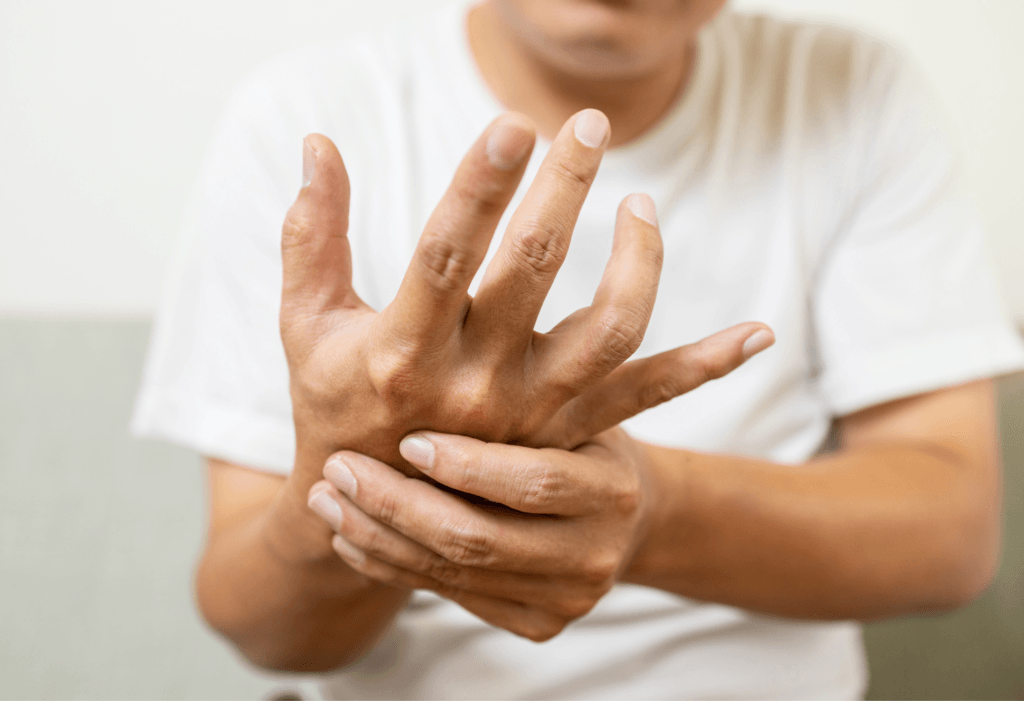Have you ever held a cup of coffee and noticed a slight tremble in your hand? Or maybe you’ve experienced a more pronounced shake while writing or typing. Shaky hands are more common than you might think, and they’re not always a reason for concern. But what happens when this shaking becomes a part of your daily life?
This article explains why your hands are shaking, what causes this shaking, and how to deal with shaky hands.

Shaky hands, also known as hand tremors, are common. They involve involuntary, rhythmic muscle contractions that cause shaking movements in one or both hands.
It’s important to understand that hand tremors are not always a cause for alarm. Often, they’re a benign condition, occurring sporadically due to factors like stress or fatigue. However, in some cases, they can be a symptom of a neurological disorder or other medical condition.
Most people experience hand tremors at some point in their lives. These tremors can manifest in various ways, from a barely noticeable quiver to more pronounced shaking. It’s interesting to note that while we often associate shaky hands with older adults, this condition can affect people of any age. Understanding what shaky hands are is the first step in determining whether it’s a temporary condition or a sign of something more serious.
What are the different types of shaky hands?
Hand tremors are not a one-size-fits-all condition. In fact, they’re categorized into different types based on their appearance and cause. The most common types include physiological tremors, essential tremors, and Parkinsonian tremors.
- Physiological Tremors: These are mild tremors that are typically not noticeable. They can be exacerbated by stress, extreme emotions, fatigue, caffeine, or certain medications. Physiological tremors are generally considered normal and don’t signify an underlying health issue.
- Essential Tremors: Unlike physiological tremors, essential tremors are usually more noticeable and typically worsen over time. They are often genetic and can affect various parts of the body, though the hands are most commonly involved. Essential tremors are not caused by an underlying disease but can significantly impact daily activities.
- Parkinsonian Tremors: These tremors are a hallmark of Parkinson’s disease and usually occur at rest. They can be characterized by a “pill-rolling” motion of the fingers and often accompany other symptoms of Parkinson’s disease, such as stiffness and slow movement.
What causes shaky hands?
Identifying the cause of shaky hands is crucial, as it guides the approach to management and treatment. While sometimes the cause is benign, such as anxiety or too much caffeine, other times it can be more serious.
- Lifestyle factors: Stress, caffeine, and lack of sleep are common culprits behind temporary hand tremors. These are usually harmless and resolve once the triggering factor is addressed.
- Medical conditions: Several medical conditions can cause hand tremors. This includes hyperthyroidism, where an overactive thyroid gland produces excessive hormones, leading to tremors. Neurological disorders like Parkinson’s disease, essential tremor, and multiple sclerosis can also cause tremors as a symptom.
- Medications: Certain medications, particularly those used for asthma, depression, or mood disorders, can induce tremors as a side effect.
It’s crucial to note that understanding the underlying cause is key to addressing shaky hands effectively.
How to manage shaky hands?
Managing shaky hands depends largely on the underlying cause. For tremors caused by lifestyle factors, simple changes like reducing caffeine intake, managing stress, and ensuring adequate sleep can significantly help. In cases where medical conditions are the cause, the following approaches are often recommended:
- Medication: Depending on the cause, doctors may prescribe medications to reduce or manage tremors. For instance, beta-blockers are commonly used to manage essential tremors and L-dopa is used to treat Parkinson’s tremor.
- Lifestyle Modifications: Incorporating regular exercise, practicing relaxation techniques like yoga or meditation, and maintaining a healthy diet can help manage symptoms.
- Physical Therapy: For some, physical therapy can help strengthen muscles and improve coordination, reducing the impact of tremors on daily activities.
Conclusion
Shaky hands, or hand tremors, can be a benign, temporary condition or a symptom of a more serious medical issue. Understanding the type and cause of the tremor is vital for effective management. If you’re experiencing persistent or worsening tremors, it’s important to consult a healthcare professional for an accurate diagnosis and appropriate treatment plan. Remember, while shaky hands can be concerning, in many cases, they are manageable with the right approach and lifestyle modifications.